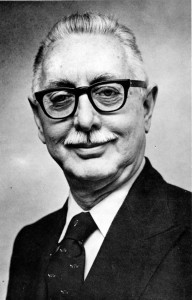Excerpts from eulogies given by two colleagues of Gordon Derner—George Stricker, Ph.D. and Joseph Newirth, Ph.D.
 At a 1983 memorial service held in honor of Gordon F. Derner, Ph.D., the founding dean and namesake of the Gordon F. Derner Institute of Advanced Psychological Studies, friends and colleagues paid tribute to his life and legacy with eloquent eulogies.
At a 1983 memorial service held in honor of Gordon F. Derner, Ph.D., the founding dean and namesake of the Gordon F. Derner Institute of Advanced Psychological Studies, friends and colleagues paid tribute to his life and legacy with eloquent eulogies.
Here, we share excerpts from eulogies given by two colleagues—George Stricker, Ph.D., former Derner Institute dean and distinguished research professor, and Joseph Newirth, Ph.D., Derner Institute professor.
Eulogy for Gordon F. Derner, Ph.D., 1983 (Excerpted)
Given by George Stricker, Ph.D., former Derner Institute Dean and Distinguished Research Professor
Gordon was probably the single most caring, compassionate person that I have known, and the generosity of his spirit was boundless. I will never forget when I first came to Adelphi and, in the first few months, required some minor surgery. Because I hardly knew anyone, and the condition was not serious, I did not expect to receive much attention. The first night that I was in the hospital the phone rang; it was Gordon, and after wishing me well, he went on to talk about some of the myriad things with which he was involved. After the conversation, I felt supported, pleased that he had taken so much time for me, and very grateful for this nice gesture. I was wrong. When he called again on the second and third nights, I realized that it was not a gesture at all, but a spontaneous expression of his genuine feelings. Over the years I don’t know how many times I saw this repeated, as he always made the time to make difficult phone calls or write compassionate notes to friends experiencing personal troubles. I have never known a person with such an unerring knack for saying the right thing at the right time.
Perhaps his sensitivity to the plight of others was honed by his own delicate health, or the precarious condition of his beloved son, Kurt. This may be so, but he never imposed those difficulties on others, and my second memory concerns the zest with which he lived, the endless curiosity he displayed, and the enthusiasm he brought to all his undertakings. I always marveled, as I persisted in overprotecting and sheltering my own children, at how he would leap from one seeming precipice to another, bringing the joy of life to all he touched. He found simple delight everywhere, in a fine meal, a creative performance, a native ceremony, conversation with literally hundreds of friends. Nobody brought as much truth to the platitude about living life to the fullest, and his contagious enthusiasm contributed to his being a memorable companion. It is rare for me to travel anywhere, identify myself as being from Adelphi, and not hear a fond anecdote about Gordon.
I have always been struck by some of the commonalities between Gordon and one of my boyhood heroes, Jackie Robinson, and I think Gordon would have enjoyed the comparison with a man he also admired. They were both pioneers, charismatic figures who came to be larger than life and symbolized their causes. They both were widely appreciated by people who shared their cause, but abused by its opponents. They both had health problems which led to them being taken from us before their time, but left an unforgettable legacy behind. Roger Kahn, in eulogizing Jackie Robinson, spoke words that also fit Gordon Derner. He said, “He did not merely play at center stage. He was center stage, and wherever he walked, center stage walked with him.”
Eulogy for Gordon F. Derner, Ph.D., 1983 (Excerpted)
Given by Joseph Newirth, Ph.D., Derner Institute Professor
Gordon was basically a populist. This probably came from growing up without advantages and identifying with outsiders, with the weak and with the poor. When most other psychologists simply talked about change, Gordon made sure to open the doors at Adelphi to Blacks and Hispanics, who wished to by psychologists. An important part of Gordon’s legacy was his commitment to the poor, the weak and the disenfranchised—He was truly a great humanist.
For further information, please contact:
Todd Wilson
Strategic Communications Director
p – 516.237.8634
e – twilson@adelphi.edu